-
TrackoBit
Manage commercial vehicles with the new-age Fleet Management Software
TrackoBit -
TrackoField
Streamline your scattered workforce with Field Force Management Software
TrackoField -
Features Resources
-
Blog
Carefully curated articles to update you on industrial trends. -
White Paper
Insightful papers and analysis on essential subject matters. -
Glossary
Explore an alphabetical list of relevant industry terms. -
What’s New
Get TrackoBit & TrackoField monthly updates here. -
Case Study
Explore the cases we solved with our diverse solutions. -
Comparisons
Compare platforms, features, and pricing to find your best fit.
-
About Us
Get to know TrackoBit: our team, ethos, values, and vision. -
Careers
Join the most dynamic cult of coders, creatives and changemakers. -
Tech Support
Learn about our technical support team and services in detail. -
Events
Check out the exhibitions where we left our marks and conquered. -
Contact Us
Connect with us and let us know how we can be of service.
Plan Delivery Route Like Pro to Save Time and Boost Efficiency
- Author:Tithi Agarwal
- Read Time:10 min
- Published:
Table of Contents
Toggle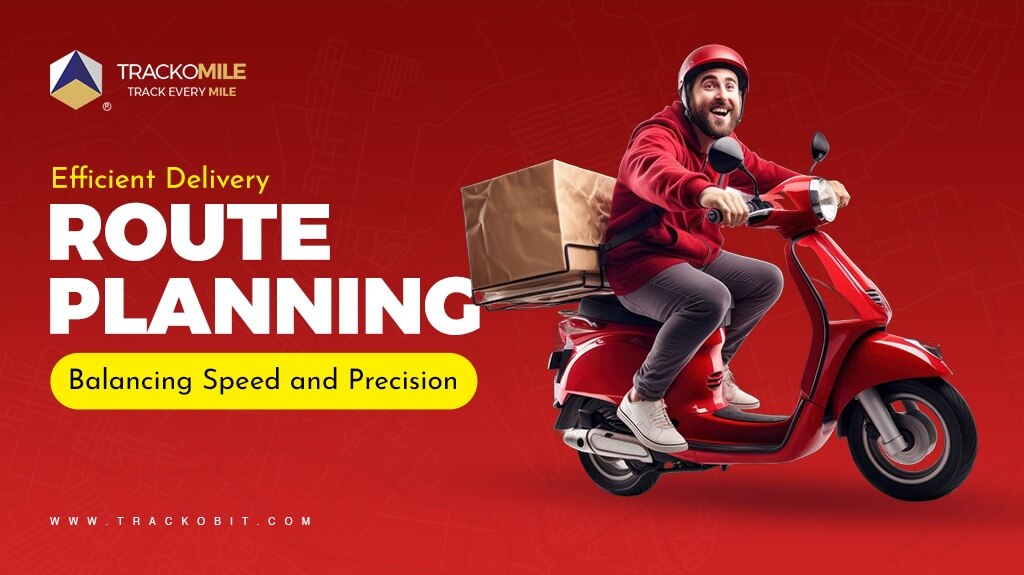
Delayed deliveries are a big no-no in the last-mile delivery business. Efficient routing plays a vital role in delivering goods on time. But which is the best method to find optimum routes—manually via Google Maps or using route optimization software? Read to find out.
Table of Contents
Toggle
Time is important for all kinds of business operations. But time holds a different meaning when you are a last-mile delivery business owner who has to ensure that the order reaches the customer not a minute late, not a minute earlier…just on time.
The delivery route plays a vital role in making this possible. Drivers or delivery agents are not fully aware of the nature or priority of the order. Because they have not been told from the dispatching team’s end. As a result, they can take any route they like and follow delivery halt signs they find convenient. This is why effective route planning and allocation are vital.
But how do you go about it? Do you plan the route and halt manually, or do you rely on Google to get the job done, or is there a God-sent solution—route optimization? Well, here is a complete guide on how you can plan the most efficient route in a short time.
What is a Delivery Route Planner?
A delivery root planner is a solution that eliminates the guesswork of planning the most efficient routes for your delivery drivers by leveraging technology and algorithms. Instead of manually mapping out stops one by one, the route planning software automates and optimizes multi-stop routes, allowing drivers to deliver orders without missing any halt.
These advanced route planners consider real-time data like traffic conditions, street terminations, and driver schedules to create the most efficient routes. The best delivery route planners also integrate turn-by-turn navigation and location tracking so that you can monitor your fleet’s progress.
A few key benefits of using an automated delivery route planner include:
- Reducing planning time and eliminating human error.
- Minimizing drive time, fuel costs, and vehicle wear and tear.
- Improving on-time deliveries and customer satisfaction.
- Boosting driver productivity and billable hours.
- With an effective route planner, you can streamline everyday dispatch operations without sacrificing efficiency.
Importance of Planning Routes in Last Mile Delivery
Efficient route planning is the backbone of any successful delivery operation. It offers a multitude of benefits apart from cost savings. Here’s why optimizing delivery routes is essential:
Cost Reduction
Effective routes ensure cost savings and environmental responsibility by reducing fuel costs and encouraging environmentally friendly transportation methods.
Driver and Operation Productivity
Well-planned routes streamline delivery procedures, maximizing driver efficiency and assuring timely deliveries without needless delays, hence enhancing total productivity.
Customer Satisfaction
Strategic planning ensures on-time delivery, surpasses client expectations, and builds confidence. As a result, customers are happy and more inclined to use the company again and refer it to others as well.
Brand Reputation
Ineffective route planning can cause delays and unhappy consumers, harming the brand’s reputation and possibly costing it commercial prospects. This highlights how crucial route planning is to preserve a positive brand image.
Businesses cannot stress enough how important delivery route planning is, both for cost savings and customer happiness.
3 Ways You Can Plan a Delivery Route
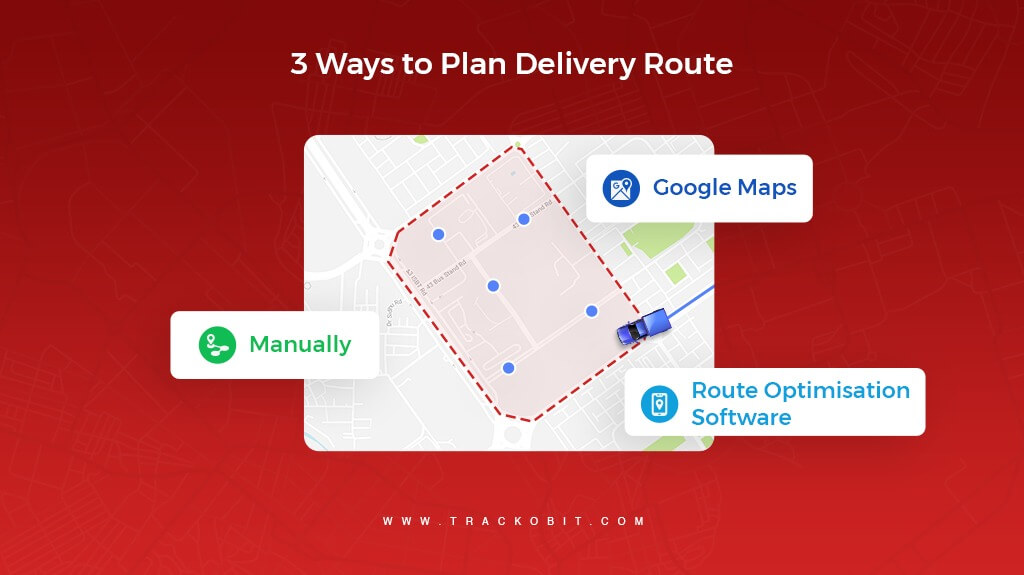
The primary approaches to planning delivery routes include
Delivery Route Planning Manually
The manual route planning option is the conventional one. While cost-effective, this procedure is exceedingly time-consuming, prone to errors, and less accurate than other solutions. Small enterprises with few routing requirements are blindly using this method.
Manual route planning requires a physical map, writing instruments, and a list of delivery stations and drivers. However, there are some disadvantages to relying on manual route planning over physical maps.
- It is hard to ensure no duplicity in halts or orders.
- One cannot accurately estimate the distance between the stops while sequencing them.
- There is no way of getting past data on traffic patterns, the distance between the stops, and the anticipated stop time.
- Rearrangement of stops and routes can go all wrong as it can be hard to consider delivery priorities and time constraints without spending a great number of hours.
- There is a complete lack of visibility, so there is no way to verify the completion of all the scheduled deliveries.
As you can see, this method is labor-intensive and does not incorporate data like digital technologies.
Delivery Route Planning Through Google Maps
Google Maps is a free and user-friendly option for basic route planning and navigation. The steps to plan a delivery route through Google Maps are:
- Step 1: Launch Google Maps and type the address of the first stop into the search field.
- Step 2: To add more stops one at a time, click “Directions” and then the “+” button.
- Step 3: Click and drag the stops to reorder them properly, if necessary.
- Step 4: Go over the entire route and make any last-minute adjustments.
- Step 5: To start turn-by-turn guidance to the first stop, click “Start.”
Google Maps is a well-known and user-friendly tool, although its routing optimisation features are somewhat limited. It ignores other logistical factors like traffic forecasts, vehicle specifications, and driver schedules.
Limitation of Planning Routes on Google Maps
No matter the efficiency and free-to-use nature of Google Maps, there are still some limitations to it:
Limitation on adding stops: The capacity of route optimisation software to accommodate an infinite number of stops per route is a major selling point. A route’s traditional planning procedures get more complicated the more stops it has. But using route planning software, you can quickly arrange a delivery route in a matter of minutes, regardless of how many stops you have—ten or hundreds.
Lack of optimization: Manual route design, in the absence of sophisticated algorithms, frequently results in inefficient routes that raise mileage, fuel expenditures, and travel times. This underutilization can have a major negative effect on operating expenses and profitability, particularly for companies that employ big delivery fleets.
Inability to adapt: Manually planned static routes are not adaptable to real-time events such as unforeseen delays, road closures, or traffic interruptions. This inflexibility can lead to major setbacks, missed delivery windows, and disgruntled clients.
Limited visibility: Businesses cannot access real-time information about driver positions, order status, and delivery performance indicators without integrated tracking and reporting. Because of the lack of transparency, making data-driven decisions and identifying areas for improvement may be challenging.
Inconsistent customer experience: Manual processes increase the risk of delays, missed deliveries, and inconsistent service, prompting disappointed clients and potential damage to brand reputation. Consistent and reliable delivery experiences are crucial for building customer loyalty and trust.
In the absence of delivery route optimization, delivery drivers may take longer routes, which would negatively affect customer happiness, prices, scalability, and efficiency.
Delivery Route Planning Utilizing Route Optimisation Software
Software designed for route optimisation is the best option for companies looking for a sophisticated, automated solution. TrackoMile, a sophisticated route optimisation programme, provides a very effective routing experience.
Using route optimisation software, you can plan a route in the following ways:
- Step 1: With a single click, import infinite stop positions from spreadsheets or apps.
- Step 2: You can choose to include delivery information such as service times, windows of time, priorities, and more.
- Step 3: Decide how many drivers you want to use to automatically create optimised routes.
- Step 4: Consider all data inputs and determine the most efficient routes with a single click.
- Step 5: Immediately provide drivers the optimised routes and schdules to be executed.
Route optimization software uses AI and machine learning to create the most effective routes, taking into account all operational constraints. It reduces planning time, miles traveled, and expenses while offering precise ETAs, real-time tracking, and proof of delivery.
Route optimisation software offers enterprises that prioritise scalability, efficiency, and a competitive edge unparalleled possibilities.
Difference Between Manual Route Planning and Route Planning Software
| Parameters | Manual Route Planning | Route Planning Software |
| Complexity | Requires manual computation and judgment, therefore, it is frequently prone to mistakes. | Automates the process of route planning, minimizing human error and guaranteeing the best routes. |
| Time Efficiency | Laborious, requiring manual entry and route modification. | Greatly cuts down on planning time via algorithmic optimisation and automation. |
| Scalability | It becomes difficult to handle as delivery networks grow due to limited scalability. | Simple to scale up to meet expanding delivery operations and evolving needs. |
| Customization | Restricts the capacity to modify routes and adjust to evolving conditions. | Provides the ability to customise routes according to particular limitations, including vehicle limits and delivery windows. |
| Real-time Updates | Lacka real-time information about route modifications and traffic conditions. | Allows for dynamic route modifications by providing real-time updates on traffic, weather, and road conditions. |
| Cost | Typically cheaper up-front, but inefficiencies could result in increased long-term costs. | Even if the initial investment is higher, cost-effectiveness is attained through higher productivity and lower operating expenses. |
| Accuracy | Prone to errors and less-than-ideal paths because of human entry. | Provides precise and optimised routes using sophisticated algorithms and data-driven insights. |
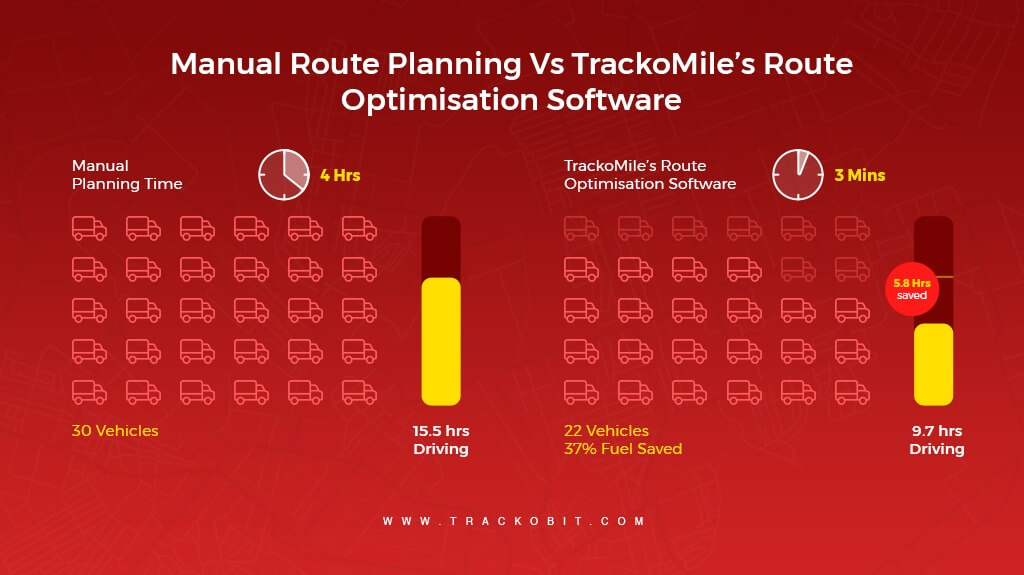
Which Situations Demand You to Consider Route Optimisation Software
Let us discover some scenarios where route optimization software emerges as a game-changer in delivery logistics.
Complex Delivery Network
Route optimization software effectively creates productive routes while examining complex delivery networks in the last leg of the delivery with several stops, frequent small window deliveries and varying requirements.
Time-sensitive deliveries
Route optimization software guarantees timely arrivals for time-sensitive deliveries, expects adherence to strict delivery windows, limits delays, and enhances customer loyalty.
Dynamic traffic conditions
Route optimization software automatically modifies routes in real-time to avoid congestion and increase productivity in places with high traffic or changing road conditions.
Enhances optimization
Software for route optimization considers variables like driver availability and vehicle capacity, ensuring efficient resource use and reducing operating costs.
Expanding operations
Route optimisation software offers scalability, allowing firms to grow and expand their distribution operations while accommodating higher delivery volumes and retaining efficiency.
Competitive edge
Businesses can get a competitive edge by using route optimisation software to optimise their routes and provide better customer service, encouraging repeat business and growth.
Because of this, integrating route optimisation software into crucial scenarios transforms delivery logistics by maximising routes, enhancing productivity, and raising the bar for client experiences.
Presenting TrackoMile’s Route Planning Capabilities to Help Businesses Make the Best of Their Operations
Route Planner gives enterprises the ability to optimise their routes. Its sophisticated algorithms swiftly produce driver-friendly routes with several stops, saving time and money compared to manual planning or simple tools.
TrackoMile offers an all-in-one platform for driver tracking in real-time and proof of delivery. Furthermore, TrackoMile easily manages intricate routing specifications, taking into account variables like traffic, delivery windows, and vehicle capacities to guarantee optimal effectiveness.
TrackoMile stands out because of its extensive feature set that is specifically designed for delivery operations. Here are a few of them:
Excel Import
To avoid manually entering various addresses and data, save time and reduce data input errors by importing them from your system. The ability to import Excel files expedites the procedure and allows uploading substantial amounts of data quickly.
One-click Dispatch
Send them to the appropriate delivery drivers as soon as the routes have been optimised, and dispatch them in accordance with the delivery schedule. You can be guaranteed that your drivers are informed and dispatched with just one click, increasing efficiency and reducing delays.
Customer Notifications
To keep your clients informed about their delivery status, send them automated personalised alerts and ETAs. Customise messages to match certain requirements and preferences, and keep your clients informed at every delivery stage with individualised updates.
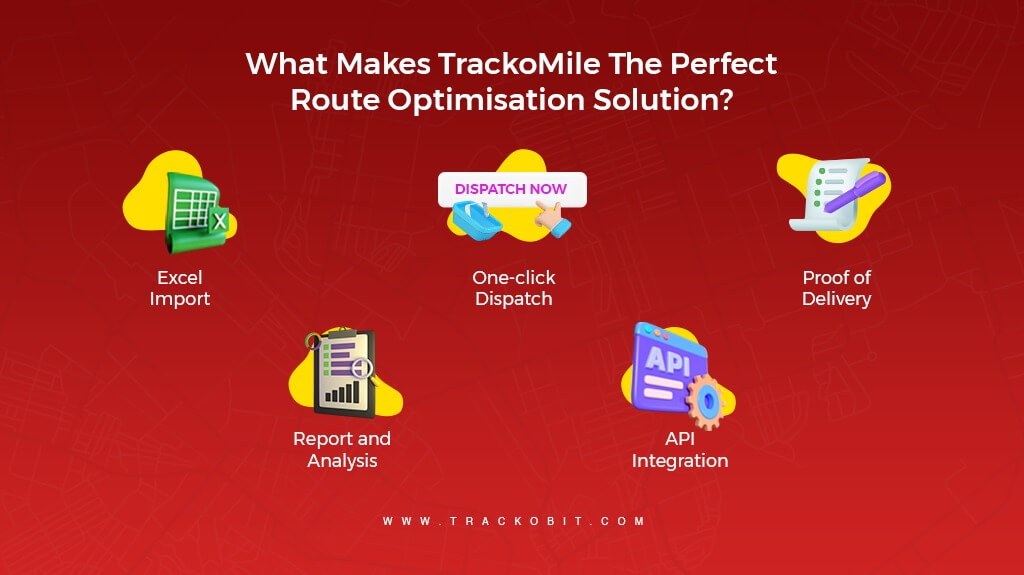
Proof of Delivery
Your delivery personnel can gather proof of delivery after each delivery is finished by taking pictures and obtaining e-signatures from recipients. This procedure guarantees correct documentation and offers proof of successful delivery for you and your clients.
Report and Analytics
You may monitor delivery status and assess your delivery drivers’ performance using on-demand reporting. Acquire insightful knowledge about delivery operations to help you make wise decisions and continuously improve your delivery procedures.
API Integration
TrackoMile may be easily integrated with any third-party software or your current program to retrieve delivery data. This connection improves workflow efficiency and guarantees flawless operation throughout your entire delivery ecosystem by facilitating the easy transfer of data across various systems.
This is how companies can effectively plan delivery routes, make the best use of available resources, and assure on-time delivery with the help of TrackoMile’s cutting-edge technology.
Conclusion
Effective route planning is essential for delivery companies that want to grow without compromising on timely deliveries. Employing cutting-edge route optimisation technologies allows businesses to access a world of game-changing advantages, including process simplification, cost savings, and previously unheard-of levels of customer satisfaction.
The secret is balancing effective time management techniques and optimised routes. TrackoMile’s route optimization software automates delivery sequencing and considers dynamic factors like traffic, weather trends, delivery windows, and 120+ variable factors This combination allows businesses to maximise driver efficiency, reduce travel time, and guarantee on-time delivery.
Tithi Agarwal is an established content marketing specialist with years of experience in Telematics and the SaaS domain. With a strong background in literature and industrial expertise in technical wr... Read More
Related Blogs
-
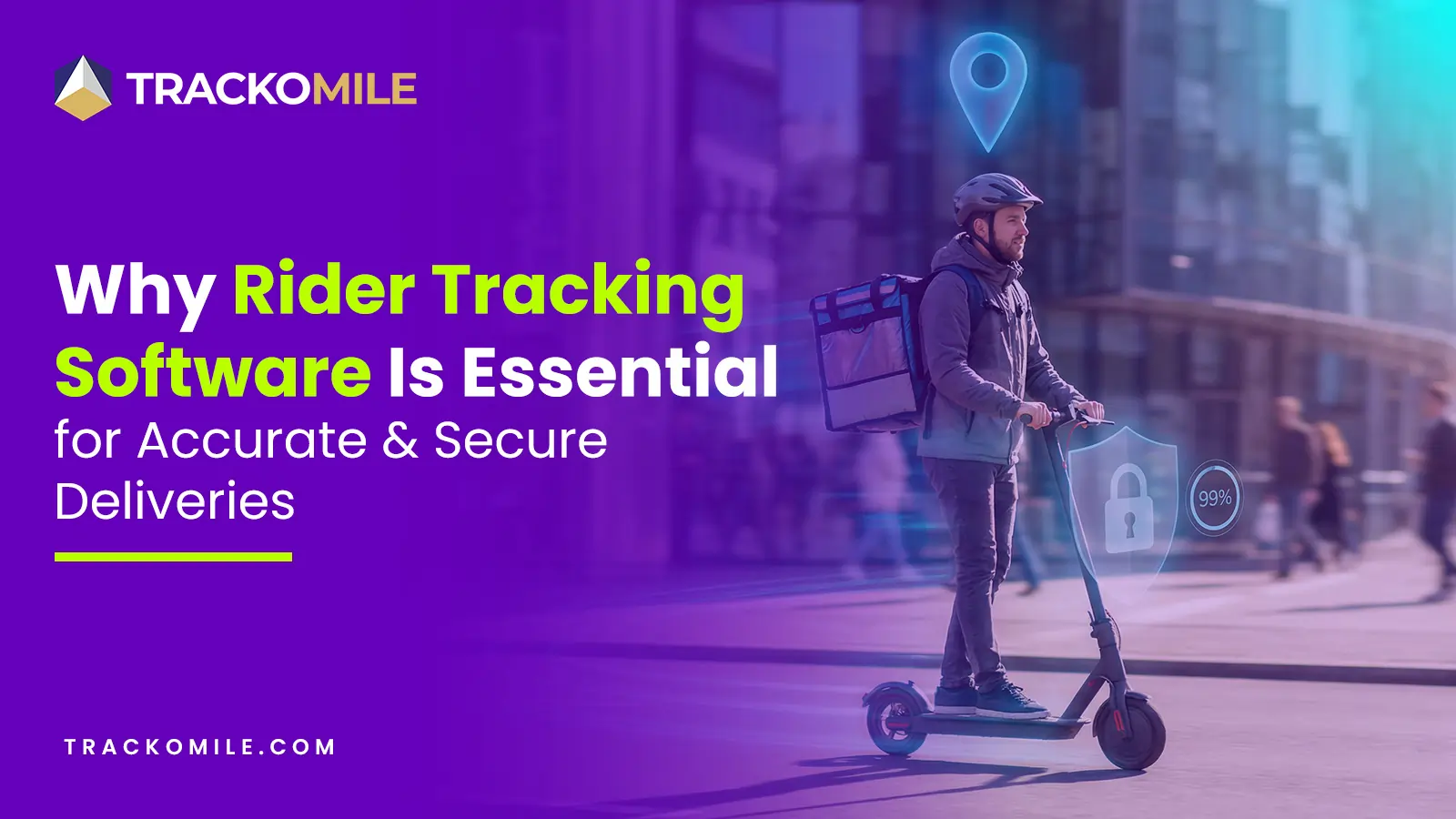
How Rider Tracking Software Improves Delivery Accuracy and Reduces Fraud
Tithi Agarwal December 8, 2025Rider tracking software improves delivery accuracy with real-time GPS visibility and automated ePOD. It also enables route optimisation and fraud…
-
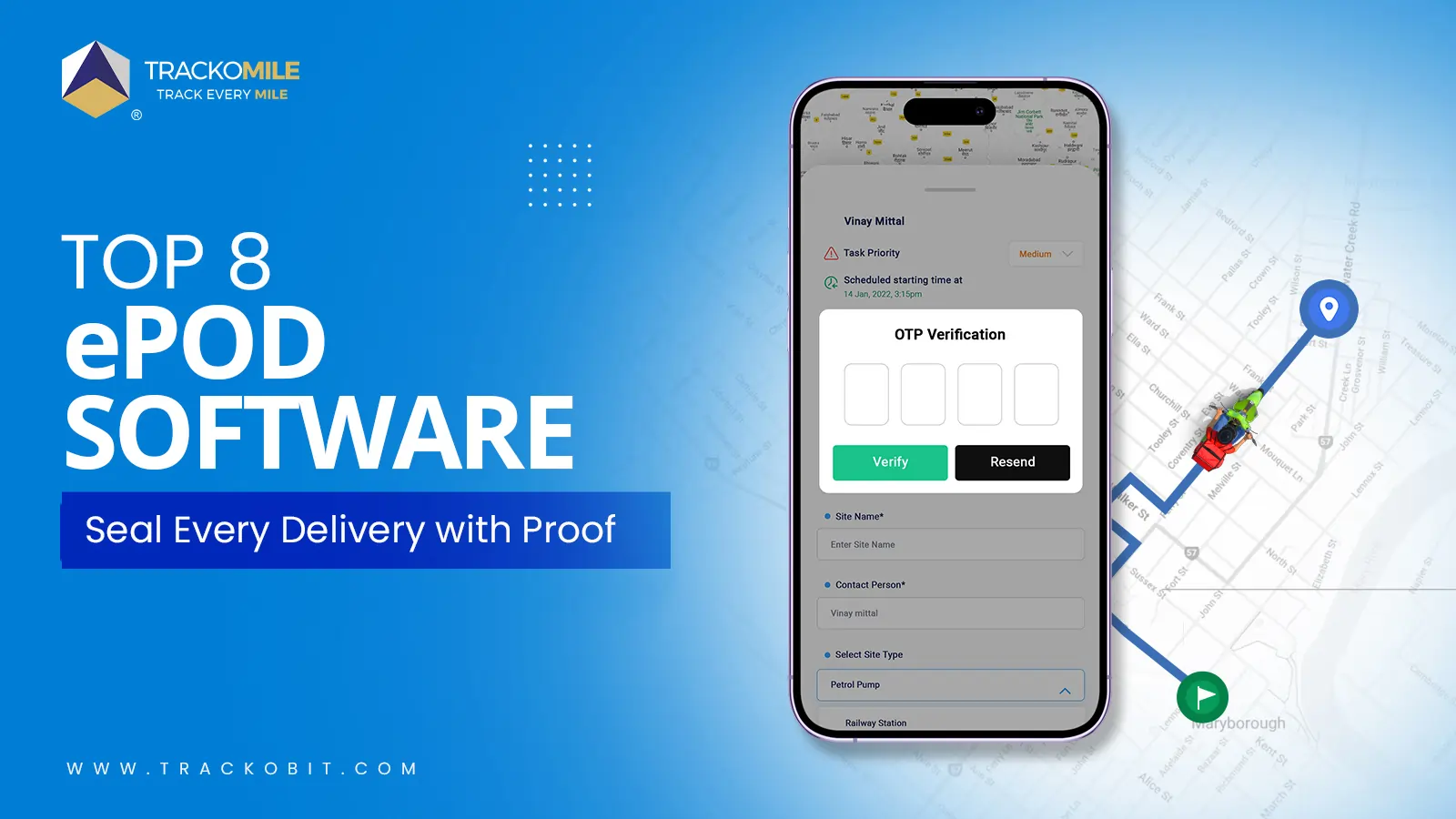
Top Electronic Proof of Delivery (ePOD) Software in 2026
Tithi Agarwal September 25, 2025Electronic proof of delivery has become the backbone of modern logistics. Explore the top 8 ePOD software in 2026 and…
-
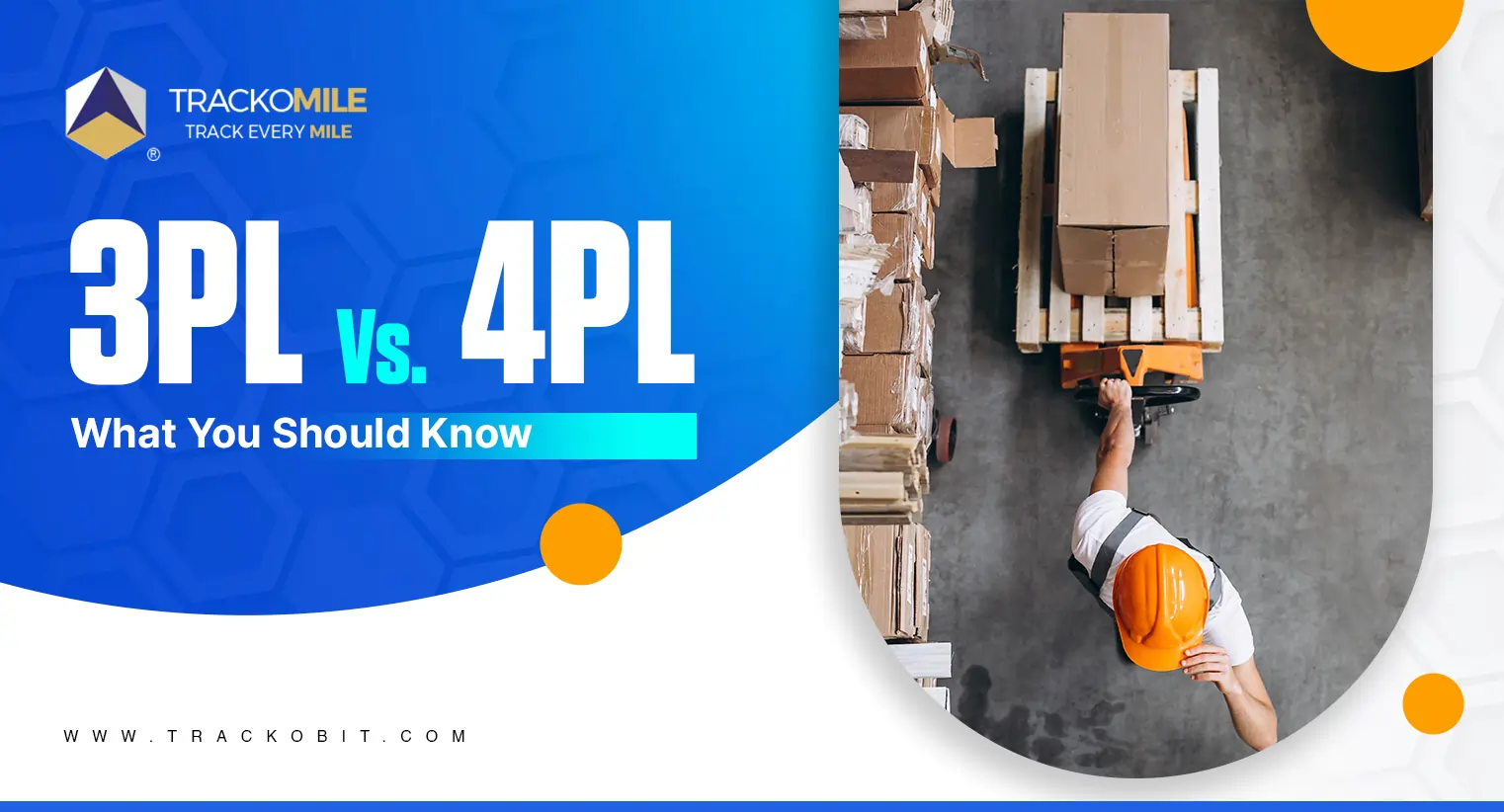
3PL vs. 4PL: Which is Best for Your Business?
Tithi Agarwal September 25, 2024Confused about choosing between 3PL and 4PL for your retail supply chain? Read this blog to find out which is…
-

What is Payload Capacity? Payload Capacity Vs. Towing Capacity
Tithi Agarwal September 10, 2024Payload capacity is the total weight a vehicle can safely carry, and it is crucial for safety and compliance. Exceeding…

Subscribe for weekly tips to supercharge your last-mile delivery.
Your inbox awaits a welcome email. Stay tuned for the latest blog updates & expert insights.
"While you're here, dive into some more reads or grab quick bites from our social platforms!"Stay Updated on tech, telematics and mobility. Don't miss out on the latest in the industry.
We use cookies to enhance and personalize your browsing experience. By continuing to use our website, you agree to our Privacy Policy.




































